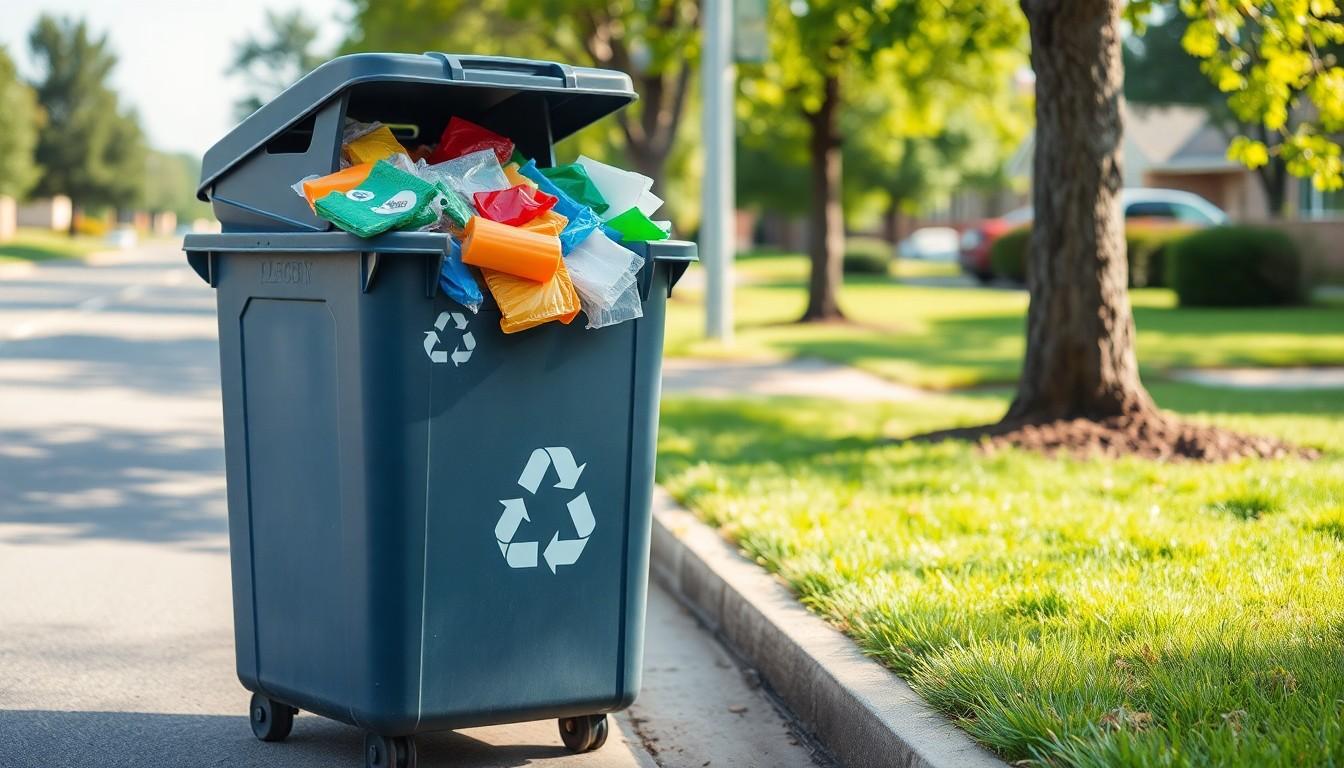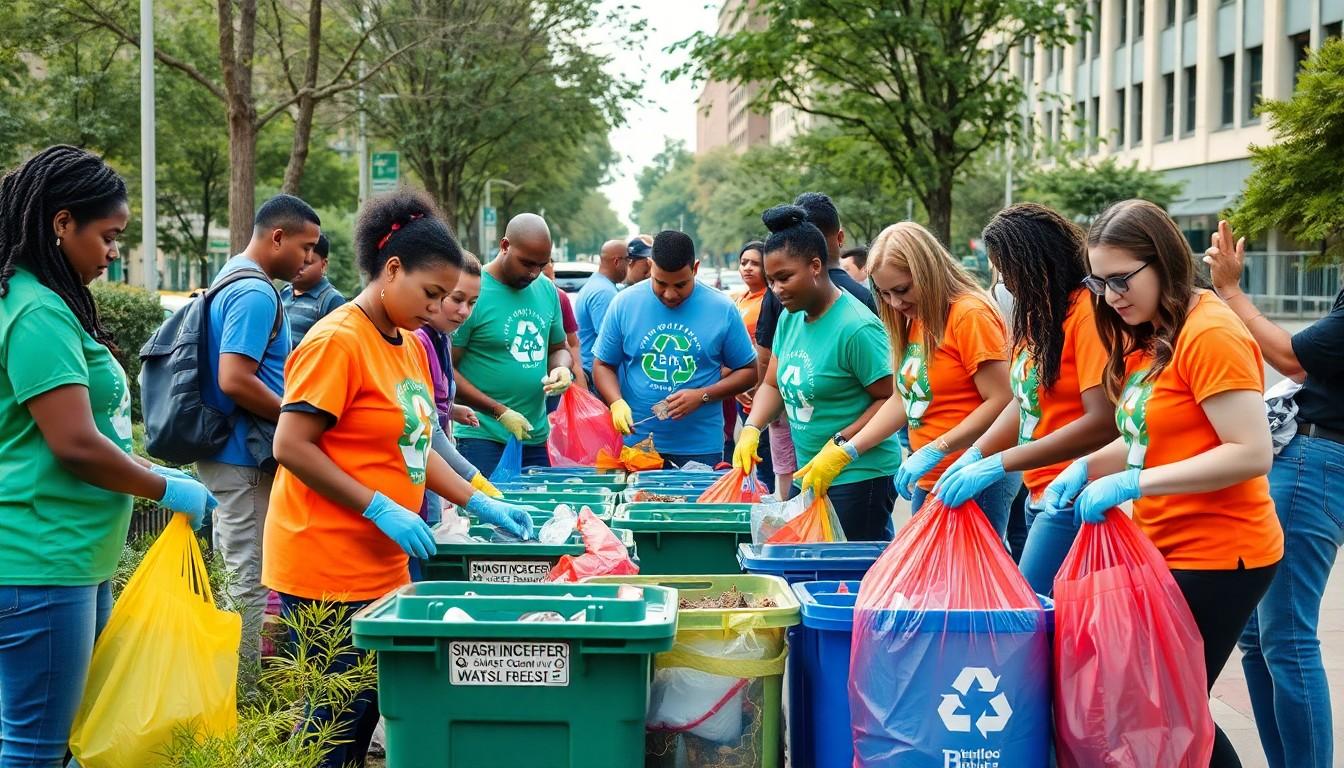In the vibrant city of Tulsa, waste management isn’t just about tossing trash into a bin; it’s a full-blown adventure in sustainability. With the growing population and the hustle and bustle of daily life, managing waste has become more important than ever. Who knew that sorting recyclables could be as thrilling as a rollercoaster ride?
From curbside pickup to recycling programs, Tulsa’s waste management efforts are designed to keep the city clean and green. So grab your gloves and put on your superhero cape, because tackling waste is a team effort! Whether you’re a seasoned eco-warrior or just starting to dip your toes into the world of waste management, there’s something for everyone in this quest to make Tulsa a cleaner, more sustainable place to live.
Table of Contents
ToggleOverview of Waste Management in Tulsa
Waste management in Tulsa focuses on sustainability and community engagement. The city offers curbside trash and recycling services to its residents, targeting efficient waste disposal and promoting recycling practices. Each household receives a blue cart specifically for recyclable materials, which include paper, plastics, and metals. Residents can enhance sustainability by following the established guidelines for waste separation.
Several initiatives exist to foster eco-friendly practices. Community clean-up events engage volunteers in maintaining Tulsa’s parks and neighborhoods. The city’s waste management department regularly organizes educational workshops to inform residents about recycling and composting benefits. These programs aim to elevate awareness and encourage participation in eco-conscious behavior among citizens.
Adopting solid waste management principles contributes to a cleaner, greener Tulsa. The city’s landfill diversion rate targets 35% by implementing various programs to minimize waste sent to landfills. This goal underscores the significance of recycling and composting in reducing landfill impact.
Effectively managing hazardous waste also plays a role in the city’s waste management strategy. Tulsa conducts periodic collection events for household hazardous waste, ensuring the safe disposal of items such as paints and chemicals. Residents can dispose of these materials responsibly, reducing potential harm to the environment.
Overall, waste management in Tulsa encompasses diverse strategies and community involvement. By prioritizing sustainability and education, the city aims to create a cleaner and more environmentally friendly urban environment for all.
Types of Waste Managed

Tulsa’s waste management system encompasses various types of waste, including residential, commercial, and hazardous materials. Each category receives tailored approaches for effective handling and disposal.
Residential Waste
Residential waste includes everyday items produced in households. This type consists of general refuse, recyclables, and organic materials. Residents place recyclables in blue carts to separate them from regular waste, which is collected in black carts. The city’s program educates its citizens on proper separation to maximize recycling efforts. Curbside composting initiatives encourage residents to divert food scraps and yard waste from landfills, enhancing sustainability practices within the community.
Commercial Waste
Commercial waste arises from businesses, offices, and institutions. This waste type often contains packaging materials, electronics, and bulk refuse. Tulsa’s waste management provides tailored services to local businesses, promoting recycling and sustainable disposal methods. Organizations can participate in specialized recycling programs and receive guidance on waste minimization strategies. By implementing effective practices, local companies contribute to the city’s landfill diversion goals while maintaining compliance with environmental regulations.
Hazardous Waste
Hazardous waste includes materials that pose risks to health and the environment. Items like batteries, chemicals, and paints fall into this category. Tulsa organizes periodic collection events to safely dispose of hazardous materials. These events help prevent contamination and promote responsible handling among citizens. Awareness campaigns highlight the importance of proper disposal, ensuring hazardous waste doesn’t enter the regular waste stream. This proactive approach protects the community and reinforces the city’s commitment to sustainable waste management practices.
Waste Management Services in Tulsa
Waste management services in Tulsa focus on efficient waste collection, recycling, and composting to promote sustainability. These services cater to the needs of a growing community while minimizing environmental impact.
Collection Services
Collection services operate on a regular schedule, ensuring timely removal of waste from residential and commercial areas. Residents receive blue carts for recyclables, while green carts accommodate yard waste. Each cart type encourages proper waste separation to enhance recycling efforts. Specialized trucks transport collected waste to appropriate facilities, where it undergoes processing and disposal.
Recycling Initiatives
Recycling initiatives in Tulsa aim for a landfill diversion rate of 35%. Residents participate in recycling through curbside pickup of materials like paper, plastics, and metals. Educational campaigns support community members in understanding recycling guidelines and proper separation techniques. Local businesses also benefit from tailored recycling programs that help them reduce their waste footprint effectively.
Composting Programs
Composting programs promote sustainable waste practices by diverting organic materials from landfills. Residents can participate by placing food scraps and yard waste in designated compost bins. These programs enhance soil quality and reduce greenhouse gas emissions, showcasing Tulsa’s commitment to environmental health. Community workshops further educate citizens on composting benefits, fostering a culture of eco-conscious living.
Challenges in Waste Management
Waste management in Tulsa faces several challenges that can impact its effectiveness. Addressing infrastructure issues and enhancing public awareness represent critical areas for improvement.
Infrastructure Issues
Infrastructure problems hinder efficient waste management in Tulsa. Inadequate waste processing facilities contribute to logistical difficulties during collection and disposal. Aging collection vehicles pose risks, affecting timely pickups and waste processing. Limited access to recycling centers restricts residents’ ability to recycle materials conveniently. To overcome these obstacles, investment in modernized equipment and expansion of processing in the city is essential.
Public Awareness and Participation
Public awareness around waste management needs strengthening. Many residents lack knowledge about recycling guidelines, resulting in contamination of recyclable materials. Engaging citizens through targeted educational campaigns boosts participation in recycling and composting programs. Hosting community workshops allows individuals to learn proper waste separation techniques and emphasizes the significance of sustainable practices. Increased awareness fosters a sense of responsibility among citizens, encouraging them to actively participate in waste reduction efforts.
Future of Waste Management in Tulsa
Waste management in Tulsa is set to evolve significantly, emphasizing sustainability and community engagement.
Sustainable Practices
Recycling initiatives play a crucial role in waste management efforts, aiming for a landfill diversion rate of 35%. Each household participates by using blue carts for recyclables such as paper, plastics, and metals. Community workshops educate residents about proper waste separation, enhancing participation in these programs. Composting initiatives promote the diversion of organic materials, preventing food scraps and yard waste from entering landfills. Engaging citizens through clean-up events further fosters a culture of environmental responsibility. Collaborative partnerships with local businesses can also strengthen diversion strategies, encouraging them to adopt sustainable waste practices.
Innovations in Waste Reduction
Advanced technologies are shaping the future of waste management in Tulsa. Automation in collection services enhances efficiency, ensuring timely waste pickup. Smart waste bins equipped with sensors can signal when they’re full, optimizing collection routes. Implementing tracking systems allows for better monitoring of waste generation and recycling rates. Programs that incentivize businesses to reduce waste through competitive challenges spur innovation. Exploring partnerships with tech startups may introduce new tools and resources. Each of these innovations contributes to the overarching goal of minimizing landfill usage and promoting sustainability in the community.
Conclusion
Tulsa’s commitment to effective waste management reflects its dedication to sustainability and community engagement. Through innovative programs like curbside recycling and composting, the city is paving the way for a cleaner and greener future.
Residents are encouraged to actively participate in waste reduction efforts while local businesses benefit from tailored recycling initiatives. As challenges arise, the focus on education and infrastructure improvements will play a crucial role in enhancing waste management services.
With ongoing innovations and community involvement, Tulsa is well on its way to achieving its landfill diversion goals and fostering a culture of environmental responsibility.




